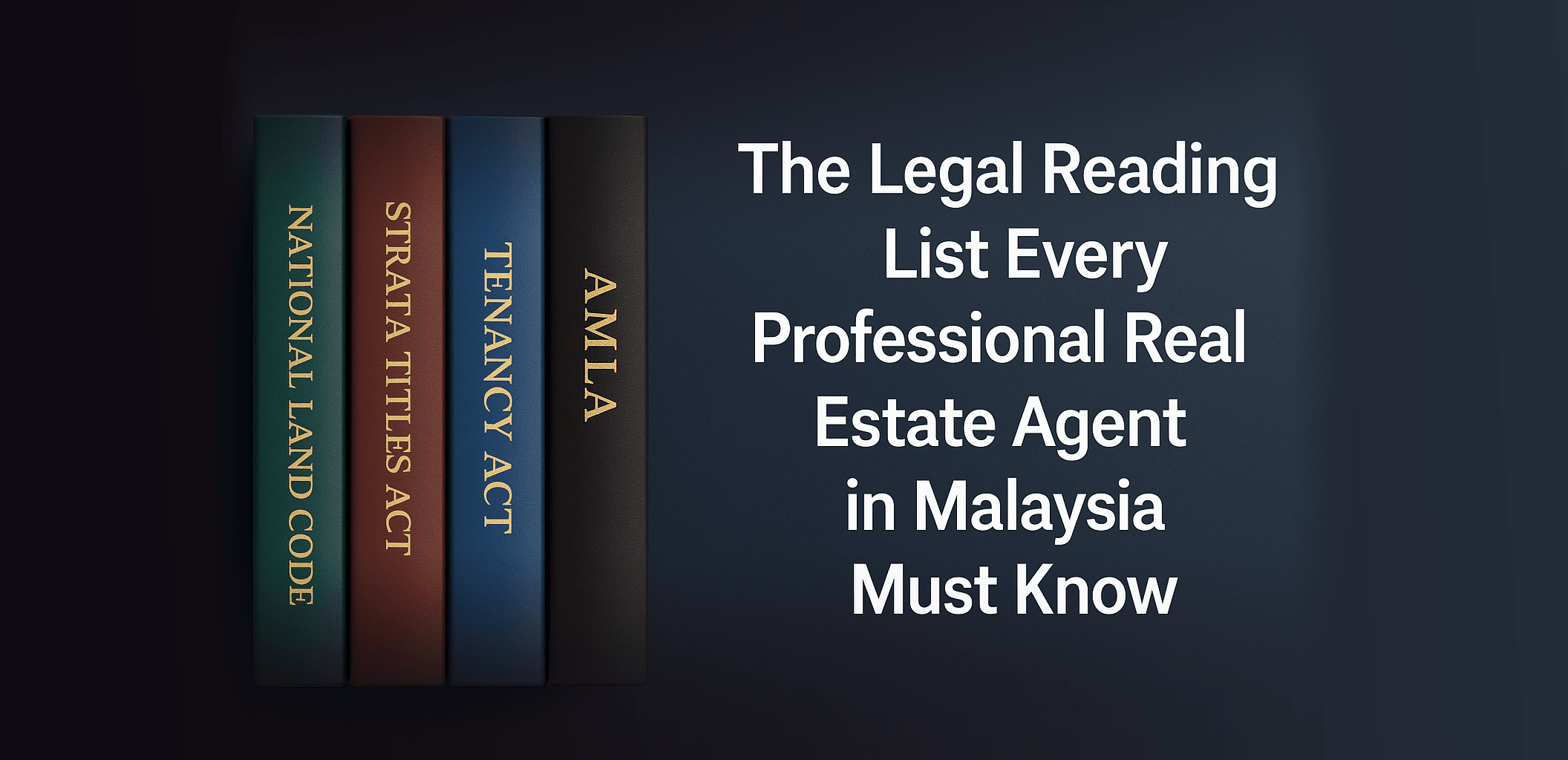The Legal Reading List Every Professional Real Estate Agent in Malaysia Must Know

Being a professional real estate agent in Malaysia requires more than just sales savvy—it demands a deep understanding of the legal and planning frameworks that underpin every transaction. Here’s your curated guide to must-read laws and policy documents that separate the truly professional agents from the rest.
1. Valuers, Appraisers, Estate Agents and Property Managers Act 1981 (Act 242)
Your licensing law. Defines who can practice, sets professional standards, handles regulation and disciplinary powers.
2. National Land Code 1965 (NLC)
The legal backbone of land ownership and dealings in Peninsular Malaysia—titles, transfers, charges, leases, caveats, and more.
3. Strata Titles Act 1985 & Strata Management Act 2013
Essential for agents dealing with high-rise residential or commercial properties. Governs ownership models, common areas, maintenance, and management bodies.
4. Anti-Money Laundering, Anti-Terrorism Financing and Proceeds of Unlawful Activities Act 2001 (AMLA)
Mandates due diligence and reporting for real estate transactions. Compliance is non-negotiable.
5. Insolvency Act 1967
Addresses how bankruptcy impacts property transactions and the process for approvals through the Director General of Insolvency.
6. Housing Development (Control and Licensing) Act 1966 (HDA)
Regulates new property developments—builder obligations, sale agreements (Schedules G & H), buyer protections, and defect periods.
7. Contracts Act 1950
Fundamental for understanding binding agreements—offer validity, consideration, breach, and enforceability.
8. Specific Relief Act 1950
Detailed remedies like specific performance and injunctions—critical when buyers or sellers backtrack.
9. Malay Reservation Enactments (State-Level Laws)
Restricts ownership of Malay Reserved Land to Malays. Must check before marketing or advising on these listings.
10. National Heritage Act 2005
Controls the management of heritage-designated buildings—renovation, demolition, redevelopment, and conservation guidelines.
11. Local Government Act 1976 & Town and Country Planning Act 1976
Regulate zoning, land usage, planning permissions, and local council jurisdictions—key for advising investors on development potential.
12. Stamp Act 1949
Covers stamp duty requirements for transfers, tenancies, and mortgages. Critical for giving clients accurate cost estimates.
13. Real Property Gains Tax Act 1976 (RPGT)
Defines tax implications on property disposals, exemptions, and strategically advising clients on timing and exemptions.
14. Malaysia Structure Plan & Local Authority City Plans
Financial; political; developmental. These plans shape long-term growth trajectories, zoning changes, and land use policies at national and local levels.
- National and State Structure Plans outline regional development directions—including infrastructure spending, new growth zones, and environmental safeguards.
- Local Authority or City Plans (e.g., Kuala Lumpur City Plan, Petaling Jaya Local Plan) provide detailed zoning guidance, building density, land use permissions, and transport networks.
Knowing these will allow you to anticipate upcoming development zones, advise on future capital appreciation, and accurately counsel investors or developers.
15. The Upcoming Residential Tenancy Act (RTA)
Still pending implementation. Will aim to standardize tenancy agreements, deposit handling, dispute resolution, and landlord–tenant rights. Stay updated.
Where to Begin
Start with your professional and property-law fundamentals: Act 242, National Land Code, and Strata Titles & Strata Management Acts. Then expand into:
- Transaction laws: AMLA, Contracts, HDA, Specific Relief, Insolvency, Stamp Act, RPGT
- Planning Framework: Structure Plans, Local Authority Plans, Heritage & Malay Reservation
- Emerging Regulation: Residential Tenancy Act
Why These Matter
Reading these legal and planning documents transforms you from a transactional agent into a trusted advisor. If you can interpret how zoning changes, development plans, or tax rules affect property value, you become an indispensable resource.











































































































